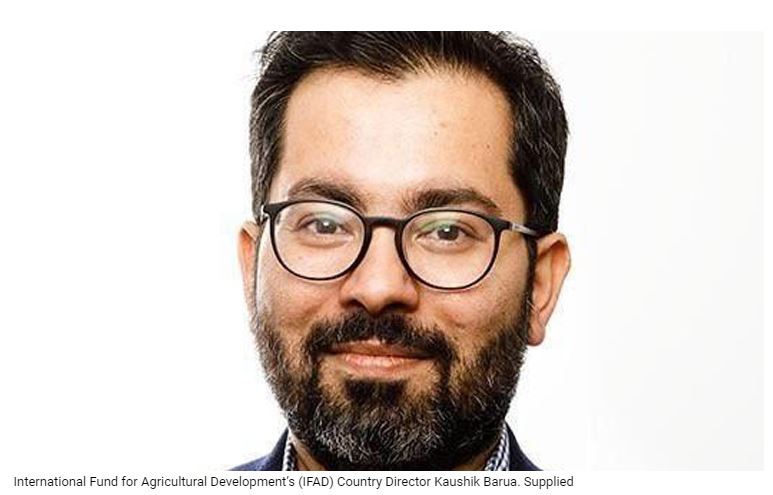Cambodian smallholders ‘most challenged in the region’
Cambodia’s agriculture has been a key pillar of its economic success, contributing through poverty reduction, income generation and enhanced food production. However, challenges remain to be seen and the sector needs to focus on new skills to increase labour productivity and technology to improve land productivity and value chains. Khmer Times reporter Sorn Sarath sat down with the International Fund for Agricultural Development’s (IFAD) Country Director Kaushik Barua to discuss the challenges and progress of the Kingdom’s agriculture sector, especially for smallholders.
KT: What is IFAD’s mission in Cambodia’s agriculture so far?
Kaushik: IFAD invests in rural communities, empowering them to secure sustainable economic opportunities and increase their food security. IFAD has been a partner of the Government of Cambodia and Cambodian rural communities since the 1990s, moving from recovery projects to building institutions to now focusing on the market economy and supporting Cambodia to reach upper-middle income country (MIC) status.
We also have a clear focus on women’s empowerment, supporting youth, enabling rural Cambodians to deal with climate change and promoting enhanced nutrition. We align all our programmes with Cambodia’s vision, with both the Rectangular Strategy and the Strategic Development Plan.
KT: What are the challenges for small farmers in Cambodia you have seen so far?
Kaushik: Smallholder farmers face multiple challenges in Cambodia, as in many other regions. They often don’t have access to credit on appropriate terms to enhance production or to invest in on-farm equipment or infrastructure. Smallholders are increasingly vulnerable to climate change. They also need enhanced skills and technology to access information, extension services, credit and markets. Another key priority is improving the rural road network to ensure sustainable all-weather access to markets and services.
KT: What do you need to do to solve the challenges?
Kaushik: We need to focus on new skills to increase labour productivity, technology to improve land productivity, modern infrastructure and to improve the effectiveness
of agricultural value chains. Connecting agriculture to technology needs to increase which will boost local economies.
This is a key requirement for agri-businesses. First, processing technologies are needed all along the supply chain to ensure value-added business. Second, especially in a post-COVID world, agricultural value chains will depend on digital technologies.
IFAD is working on these fronts along with its ministry partners. We are partnering with the Rural Development Bank and the Ministry of Commerce to develop loan products for small farmers. Along with the Ministry of Agriculture, Forestry and Fisheries (MAFF) and the Agricultural Services Programme for Innovation, Resilience and Extension (ASPIRE) project, we are developing new digital technologies to enable access to information and markets for small farmers, including an app named “Chamka” that was recently developed and is being rolled out.
And, with the Ministry of Rural Development, we are upgrading the rural road network and value chain infrastructure including ferry landing points and rural markets.
Along with our ministry partners and rural communities, we are developing a holistic programmatic approach to improve agricultural productivity, providing infrastructure, on-farm technical services, credit as well as new skills and technologies.
KT: How many farmers have joined the project? And in which areas? And how have their lives changed?
Kaushik: IFAD has been active in Cambodia since the 1990s, financing 10 projects with an overall programme size of more than $500 million in the last three decades. Currently all our projects are being implemented in a harmonised approach, supporting smallholders on their farms, at the markets, at the bank and online. Through this programmatic approach, we are supporting selected farmers groups across all rural provinces in Cambodia.
Through our previous projects, that have been independently evaluated, IFAD projects have contributed to increased production, ownership of assets and income for small farmers. For instance, through the Project for Agricultural Development and Economic Empowerment (PADEE) project, about 50,000 households who participated in project activities increased their incomes by more than 100 percent and their household assets by 79 percent.
Such increases in incomes (along with enhanced skills and access to services) allow rural families to enjoy healthier, more prosperous lives and contribute to Cambodia’s economic growth.
KT: What is the importance of the agriculture sector in the time of COVID-19?
Kaushik: The economic effect of the COVID pandemic is being felt through three routes: dampened global markets and therefore lower demand for exports; severe effects on the tourism and hospitality sectors because of global travel restrictions and increasing pressures on international supply chains.
There is already a significant impact in the SME [small and medium enterprise] sector and in the garment sector.
Because of these developments, many rural youths have lost their employment and are moving back home to their villages.
To both address the economic distress and prevent food security stresses, IFAD and Ministry partners are leveraging a programmatic approach and synergies across projects to respond to the COVID-19 pandemic.
There’s a twofold focus in terms of objectives: one, addressing the immediate economic needs of rural communities and creating opportunities for migrant returnees and youths who might have lost opportunities in the garment or tourism sector; two, expanding prospects for smallholder farmers through enhanced production support and through focusing on the appropriate value chains and commodities to ensure adequate food production and dietary diversity.
IFAD is aligning its response with ministry partners, with the UN’s overall COVID response (which covers both the health response and the socio-economic recovery) and with partners such as the Asian Development Bank.
Source: https://www.khmertimeskh.com/50736614/cambodian-smallholders-most-challenged-in-the-region/


 English
English




